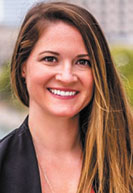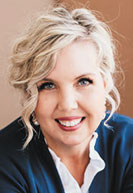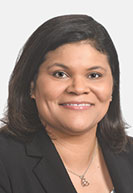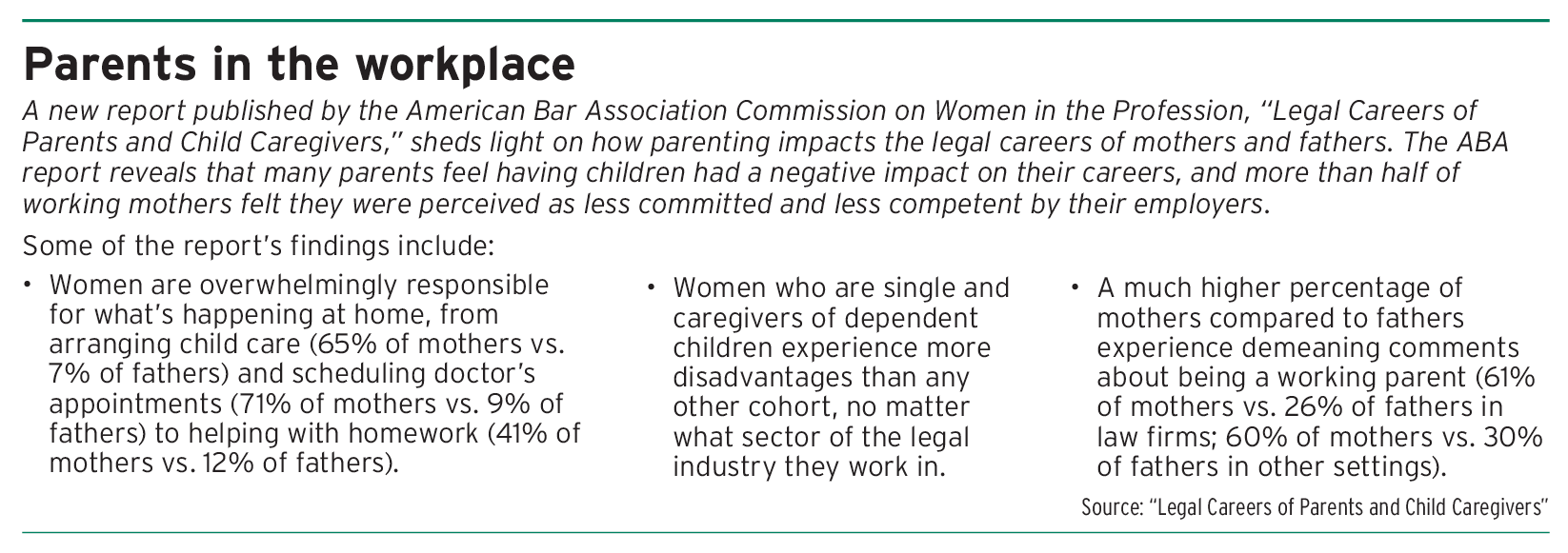Subscriber Benefit
As a subscriber you can listen to articles at work, in the car, or while you work out. Subscribe Now
Sometimes when she is on a virtual mediation hearing or client consultation at home, Rachel Brunson has all three of her children with her.
Brunson, a solo attorney at Brunson Law LLC in Greenwood, said when she worked for other law firms, including most recently Deenik Lowe LLC, leaders were always very supportive of her commitment to balance her work schedule with her responsibilities as a parent.
“The expectations at the firm were family first,” Brunson said.
But Brunson’s experience isn’t universal, according to a new report.
The report from the American Bar Association’s Commission on Women in the Profession, “Legal Careers of Parents and Child Caregivers,” has found some attorneys, particularly working mothers, continue to face negative experiences at work because they have children.
The report, based on survey responses from more than 8,000 lawyers nationwide in various work settings and a dozen focus group interviews, revealed that many parents feel having children has had a negative impact on their careers. It also found that more than half of working mothers felt they were perceived as less committed and less competent by their employers.

Michelle Browning Coughlin, an attorney with ND Galli Law in Louisville, Kentucky, and co-chair of the ABA’s research project, proposed a study on the topic when she first came on the commission.
Coughlin is also the founder and president of the national nonprofit organization MothersEsquire, which has more than 9,000 members online and advocates for gender equity, motherhood and caregiver issues. MothersEsquire started on Facebook in 2013.
When she started law school, Coughlin was already a mother.
“I saw right away how different it was to be a parent and a lawyer,” she recalled.
Coughlin said research has shown biases directed toward mothers, in general, in the workplace. Her hope was that the research on the ABA project would show the legal profession was different.
The ABA report targeted participants from a diverse base, but Coughlin said it was difficult to get men to participate.
“We had to do a targeted push to get men to participate and get data,” she said, adding that the commission finally got enough men to create statistical significance.
Her goal, she said, is to get a better understanding of the biases against working parents.
Continued challenges
The ABA research project, co-chaired by Coughlin and Dallas attorney Juanita Harris, was conducted by former commission chairs Roberta Liebenberg and Stephanie Scharf and former ABA President Paulette Brown.
Their research confirmed that “a substantial percentage of mothers in the profession have been subjected to unfounded criticisms and stereotypes, implicit biases and many adverse day-to-day experiences in the workplace that impede their advancement and ability to balance their professional and family obligations, thus leading to a continuing high rate of attrition.”
For example, 61% of mothers faced demeaning comments about being a working parent compared to 26% of fathers in law firms, and 60% of mothers and 30% of fathers in other settings. Also, 60% of mothers in law firms and 59% of mothers in other settings felt they were perceived as being less committed to their careers, compared to 25% and 30% of fathers in firms and other settings, respectively.
In addition to support from her employers, Brunson said since she started practicing in 2015, judges, other attorneys and court personnel have been very respectful and supportive when she has her kids with her.
But she also said she has friends who have felt some biases were directed toward them because they were working parents.
Brunson said it’s important for attorneys to communicate their expectations regarding parenting and work-life balance to their employers.
Slow shift

Shelley Jackson, partner at Krieg DeVault LLP’s Carmel office, said she has seen a shift over time in attitudes toward working parents in the legal industry, as well as some persisting challenges with disparities toward how women who are primary caregivers, members of underrepresented groups or single parents are treated.
She noted that since the COVID-19 pandemic, the industry has seen the emergence of remote work as a viable option for attorneys in a variety of areas, which can help working parents more easily address child care issues.
Another trend Jackson has seen become more common is firms extending parental leave to attorneys.
“I think that’s helpful for a new parent, mother and father,” she said.
Krieg DeVault’s parental leave policy for attorneys offers 16 weeks for birthing parents and 10 weeks for nonbirthing parents.
Overall, Jackson said she has acquaintances in the legal community who have felt supported by their workplace, while others had to carve out the journey they wanted.

Travis Van Winkle, a solo attorney at Van Winkle Legal in Indianapolis, also said he has seen an industry shift in the last 20 years from what he called an “old school mindset” to more of a focus on a healthy work-life balance.
“I’ve tried very hard to prioritize my kids,” Van Winkle, who has two children, said.
Still, Van Winkle said in general, female attorneys are facing a bigger struggle than men.
One resource Van Winkle pointed to is the Indianapolis Bar Association’s Helping Enrich Attorneys Lives, or HEAL, Committee that tries to focus on work-life balance for attorneys. He said the committee has brought in attorneys to talk about their experiences being a parent or a caregiver for an elderly parent.
Like Jackson, Van Winkle said he has seen some cultural shifts within the legal industry, like reductions in billable hour quotas and firms being more willing to let attorneys work remotely.
“One of the good things that came from the pandemic,” he said, “is that we had to learn how to be more efficient.”•
Please enable JavaScript to view this content.

